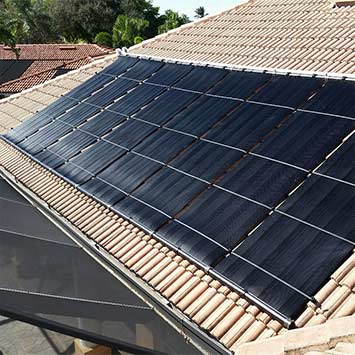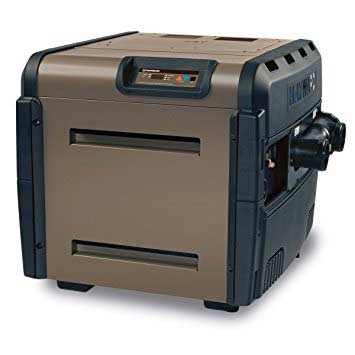


Pool owners can choose between four major forms of pool heating – heat pumps, gas, solar, and electrical resistance.
Solar Pool Heaters
• Year-round heating
• Essentially no additional operating costs.
• Very low maintenance.
• Environmentally friendly.
• Affordable initial cost.
• Long lifespan.
• No moving parts.
• Essentially no noise
Drawbacks
• Performance limited based on the weather
Because unheated pools rarely drop below 65 degrees in Southwest Florida, temperatures considered warm enough by most are attainable virtually year-round. In the spring and fall, solar heated pools are luxuriously warm, and in the summer, spa-like temperatures are often reached if heaters are not turned off. If you demand a particular temperature every day of the year, solar alone may not give you what you want
Electric Heat Pumps
• Affordable initial cost
• Moderate heating speed.
• Economical heating during good conditions.
Drawbacks
• Moving parts.
• Moderate to high maintenance costs (outside of warranty).
• Moderate service life
• Noisy.
• Energy hogs, especially in cold weather.
• Poor performance in cold weather
Performance suffers as conditions deteriorate. However, with heat pumps, poor performance means big electric bills. If you want to heat your pool sparingly when outdoor conditions are ideal. If you are an infrequent swimmer, willing to plan ahead, and willing to pay for electricity to heat your pool, heat pumps may be an acceptable alternative for you.
Gas Heaters
• Fast pool heating.
• Reliable pool temperatures year-round in any condition.
• Low initial cost (excluding tank installation and hookup if necessary).
Drawbacks
• Extremely high operating cost (fuel).
• Maintenance, especially if heavily used.
• Limited fuel source (if tank-fed).
• Short lifespan. Gas heaters are superstars when it comes to heating speed. The major drawback is operating cost. If you are the type of person that doesn’t swim often, doesn’t want to plan ahead to heat your pool, absolutely requires a set temperature year-round, or has money to burn (pun intended), a gas heater might be a good choice for you.
A combination hybrid solar pool heating system may be the ultimate option. If you can afford the upfront cost, you can let a solar pool heater take on the heavy lifting, heating your pool year-round to adequate temperatures most of the year, and “topping off” the pool to desirable temperatures when conditions are not quite good enough to meet your needs.
A solar pool heater with a gas backup is the best option if your spontaneous and infrequent with your pool use, and willing to bite the bullet and pay for gas when you want to swim in 50 degree weather on a whim (disclaimer – I have an unheated pool because I actually rarely use it, refusing to get in unless it’s 85ºF+ outside). If you are an avid swimmer for exercise, but willing to stay out of the pool when outdoor temperatures plummet, a solar pool heater with heat pump combination may be best for you, providing desirable temperatures most of the year at a reasonable operating cost. If you swim when the weather is nice, don’t want ongoing operations and maintenance costs, and love free super-hot water when available, solar pool heating alone may make the most sense for you